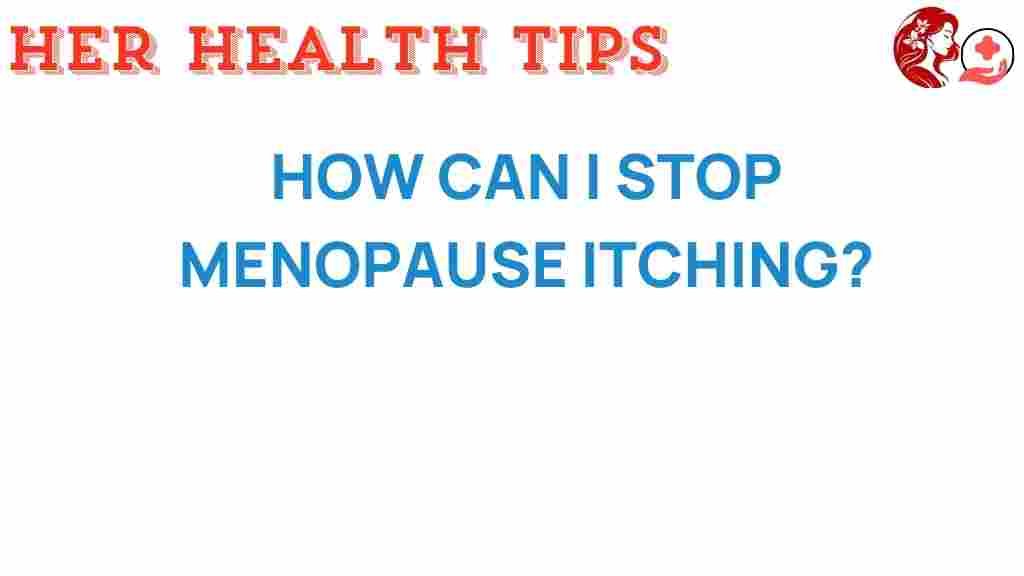Menopause Itching: Understanding and Finding Relief from Uncomfortable Symptoms
Menopause is a natural phase in a woman’s life, often accompanied by a variety of symptoms that can affect daily comfort and wellness. One of the lesser-discussed yet uncomfortable symptoms is menopause itching. This condition can lead to significant distress, prompting many women to seek effective relief. In this article, we will explore the causes of menopause itching, the skin changes that occur during this time, and various methods for relief, including hormone therapy and natural remedies.
Understanding Menopause Itching
As women transition into menopause, their bodies undergo significant hormonal changes, primarily a decrease in estrogen levels. This hormonal shift can lead to various symptoms, including menopause itching. Understanding the underlying causes of this discomfort is crucial for effective management.
Why Does Menopause Itching Occur?
Menopause itching can be attributed to several factors:
- Hormonal Changes: The decline in estrogen affects skin hydration and elasticity, leading to dryness and irritation.
- Skin Changes: Women may experience thinning skin, loss of elasticity, and increased sensitivity during menopause.
- Hot Flashes: These sudden temperature changes can contribute to sweating and subsequent skin irritation.
- Allergies: Changes in hormone levels can make the skin more reactive to allergens or irritants.
Identifying the root cause of menopause itching is essential for finding the right relief strategies.
Symptoms of Menopause Itching
Women experiencing menopause itching may notice the following symptoms:
- Persistent itchy sensations, particularly in sensitive areas
- Dry or flaky skin
- Redness or irritation on the skin
- Increased sensitivity to products previously tolerated
If these symptoms become severe or persistent, it may be wise to consult a healthcare professional for further evaluation.
Relief from Menopause Itching
Fortunately, there are several methods to alleviate menopause itching. These can be broadly categorized into hormone therapy and natural remedies.
Hormone Therapy
For some women, hormone therapy can provide significant relief from menopause symptoms, including itching. This treatment involves the administration of estrogen, which can help restore skin hydration and reduce sensitivity.
- Estrogen Replacement Therapy: This can be administered through pills, patches, or creams, targeting specific symptoms effectively.
- Consultation with a Specialist: It’s essential to discuss with a healthcare provider to determine if hormone therapy is appropriate, considering individual health history.
Natural Remedies
Many women prefer natural remedies to manage menopause itching. Below are some effective options:
- Moisturizers: Regularly applying a rich moisturizer can help combat dryness. Look for products containing hyaluronic acid or glycerin.
- Oatmeal Baths: Colloidal oatmeal can soothe irritated skin. Adding it to a warm bath can provide immediate relief.
- Essential Oils: Lavender and chamomile oils can help reduce inflammation and itchiness. Always dilute essential oils with a carrier oil before application.
- Hydration: Drinking plenty of water helps maintain skin hydration from the inside out.
Skin Care Tips for Managing Menopause Itching
Implementing a robust skin care routine can significantly alleviate menopause itching. Here are some tips:
- Gentle Cleansers: Use mild, fragrance-free cleansers to avoid irritation.
- Limit Hot Showers: Hot water can strip the skin of its natural oils, exacerbating dryness and itching. Opt for lukewarm water instead.
- Exfoliate Wisely: Gentle exfoliation can help remove dead skin cells, but avoid harsh scrubs that can worsen irritation.
- Protective Clothing: Wear breathable fabrics like cotton to reduce irritation and allow the skin to breathe.
Step-by-Step Process for Managing Menopause Itching
For those struggling with menopause itching, follow this step-by-step process for effective management:
- Identify Triggers: Keep a journal to track when itching occurs and any potential triggers.
- Establish a Skin Care Routine: Create a daily routine that includes gentle cleansing and moisturizing.
- Explore Natural Remedies: Experiment with oatmeal baths or essential oils to find what works best for your skin.
- Consider Professional Help: If itching persists, consult a dermatologist or healthcare provider for personalized advice.
Troubleshooting Tips for Persistent Menopause Itching
If you find that menopause itching continues despite your efforts, consider the following troubleshooting tips:
- Review Your Skin Care Products: Ensure that your products are free of allergens and irritants.
- Adjust Your Diet: Incorporate foods rich in omega-3 fatty acids, antioxidants, and vitamins to improve skin health.
- Maintain a Humid Environment: Use a humidifier in your home to help keep skin hydrated.
- Manage Stress: Stress can exacerbate skin issues. Engage in relaxation techniques such as yoga, meditation, or deep breathing exercises.
Conclusion
Menopause itching is a common symptom that can significantly impact comfort and overall wellness. Understanding the causes and implementing effective relief strategies, such as hormone therapy and natural remedies, can help alleviate discomfort. By adopting a comprehensive skin care routine and considering lifestyle adjustments, women can unlock relief from these uncomfortable symptoms. Remember, if symptoms persist or worsen, it’s essential to consult a healthcare professional for tailored advice and treatment.
For more information on menopause and wellness, visit this resource.
For personalized skincare tips, check out this guide.
This article is in the category Wellness and created by HerHealthTips Team
